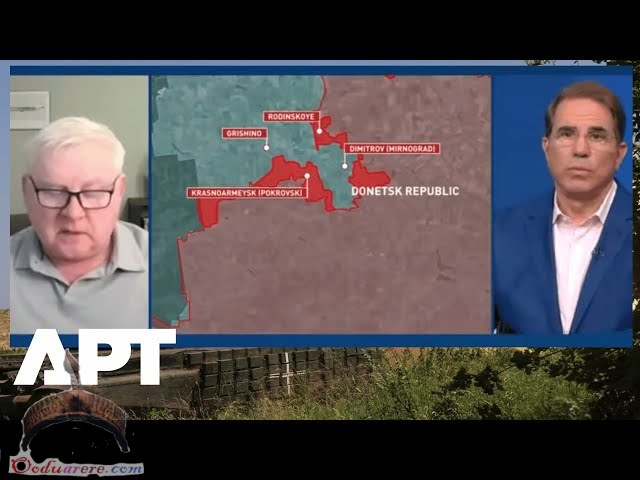This column has been written for the Unz Review.
The Internet has been buzzing with reactions to the latest Stratfor report about how a military confrontation between Russia and the United States would play out. I did not find the full text, I suppose it is behind a Stratfor paywall or for subscribers only (and, frankly, I have better use for my time and money than to subscribe to that rubbish), but since the same excerpts are quoted everywhere, I might as well list them here and assume that they form the highlights of the article. Here we go (taken from the Business Insider quoting and paraphrasing the original article):
While Russia has some advanced surface-to-air missile systems and very agile fighter aircraft in Syria, it wouldn’t fare well in what would be a short, brutal air war against the US (…) Russia has “about 25 planes, only about ten of which are dedicated to air superiority (Su-35s and Su-30s), and against that they’ll have to face fifth-gen stealth fighters, dozens of strike fighters, F-15s, F-16s, as well as B-1 and B-52 bombers. And of course the vast US Navy and pretty much hundreds of Tomahawks.” “Russians have a lot of air defenses, they’re not exactly defenseless by any means,” Lamrani told Business Insider, “But the US has very heavy air superiority.” Even though individual Russian platforms come close to matching, and in some ways exceed the capability of US jets, it comes down to numbers. If US surveillance detected a mass mobilization of Russian jets in response to the back-and-forth, the US wouldn’t just wait politely for Russians to get their planes in the sky so they can fight back. Instead, a giant salvo of cruise missiles would pour in from the USS George H. W. Bush carrier strike group, much like the April 7 strike on Syria’s Sharyat air base. But this time, the missiles would have to saturate and defeat Russia’s missile defenses first, which they could do by sheer numbers if not using electronic attack craft. Then, after neutering Russia’s defenses, the ships could target the air base, not only destroying planes on the ground but also tearing up the runways, so no planes could take off. At this point US and Coalition aircraft would have free reign to pass overhead and completely devastate Russian forces.
So is the author, Omar Lamrani, right in his assessment? Yes and no. Yes, that is exactly what would happen if the Russians decided to engage their small number of air superiority aircraft to try to prevail over the entire CENCOM and NATO air force for the control of the Syrian skies. And no, simply because the Russians would never do that.
The author of the article, a civilian with no military experience, makes a basic mistake, he assumes that the Russians will act like idiots and fight the kind of war the US would want to impose upon them. That is kind of assumptions most newbies make and which make for excellent propaganda articles. The problem is, of course, that there is absolutely no reason at all why the Russians should collaborate with such a ridiculous scenario. So, let’s get back to basics here.
Question 1: are the Russians in a position of weakness in Syria?
Yes, absolutely. And they know that too. First, the Russians are operating only 2 facilities (Tartus and Khmeimim), far away from home, and the size of their task force in Syria is tiny compared to the huge amount of firepower available to the AngloZionists and their allies. Second, the USA have poured billions of dollars into this region to make sure that the Soviet Union could never successfully invade Iran and not only do they have an immense numerical superiority over the Russians, they also have a world-class network of bases where even more forces can be brought in. Syria is squeezed between CENTCOM to the south and east and NATO to the north and west while the closets Russian forces are in Crimea. The truth is that not only could the US and NATO take control of the Syrian skies, even Israel alone could probably do it. So, assuming the Russians are not suicidal imbeciles, what do you think they should do? If you were Russian, how would you play your cards?
Question 2: do the Russians have advantages of their own?
Absolutely. In fact, they have many advantages over the Americans. Here they are in no particular order:
- All the boots on the ground that matter are either Russian allies or at least on good terms with Russia: the Syrians, the Iranians, Hezbollah and even Turkey are all much closer to Russia than to the AngloZionists. The only AngloZionist boots on the ground that matter are Daesh & Co.
- Internal public opinion: in Russia, the Russian military intervention is understood and backed by a overwhelming majority of Russians. In the USA the public is clueless and profoundly skeptical of this latest US war of choice. Not only that, but Putin personally has an immense credibility with the Russian people, while Trump is barely avoiding being impeached.
- External public opinion: while in the USA the Ziomedia is engaged in a truly heroic effort to avoid even mentioning the fact that even the US presence in, and nevermind the actual aggression against, Syria is completely illegal in terms of international law, most of the planet is quite aware of that. This only further erodes the US standing worldwide.
- The Russians have fewer lucrative targets to offer the AngloZionists than the Americans. Simply put, the Russians have Tartus and Khmeimim. The Americans have an long list of bases and facilities in the region which all could become potential targets.
- The willpower, courage and determination of the Russian solider is stronger than his US counterparts by many orders of magnitude. There are many reasons for this, historical as well as political, but I don’t think that anybody doubts the fact that while Americans love to kill for their country, they are much less enthusiastic about dying for it, especially when the “for it” part is extremely dubious and when the frontline solider feels that he is being used in some complex political game which he does not understand but where he is definitely used as cannon fodder.
- There is Russian personnel and military hardware interspersed within the Syrian forces. We know that Russian technical specialists, military advisors and special forces are operating on the ground in Syria. This means that the Russian can probably use a Syrian S-300 to shoot down a US aircraft without necessarily giving the US proof of their involvement. To use and old CIA term, the Russian can have “plausible deniability”.
- We know that Russia has a vastly superior intelligence capability in Syria as reflected in the kind of damage Russian air and missile strike inflict on their targets especially when compared to the painfully obvious lack of US understanding of what’s really going on on the ground.
So what does all this add up to?
1) Plausible deniability in the air
First, it is pretty darn clear that the Russians have no incentive to begin a large scale air battle in the skies of Syria with their US counterparts. However, the fact that such a battle would not be in their interest does not mean that they would necessarily avoid it either. For the time being, the Russians seem to have chose a strategy of deliberate uncertainty and harassment of the US aircraft, but they could decide to engage US aircraft using their ground based S-300/S-400 batteries. Here is how they could do it.
First, the Russians are the only ones in Syria with S-400s. So let’s set them aside for a minute and keep them for serious emergency purposes. Next, let’s look at the Syrian inventory of air defenses found on Wikipedia. Notice especially this one: the Pantsir-S1 (SA-22). According to Wikipedia, there are 50 SA-22 in Syria. Have you ever heard of the Panstsir-S1? Probably not.
Forget the S-300/S-400, think Pantsir
The Pantsir-S1 (aka “SA-22” in US/NATO classification) is an absolutely awe-inspiring air defense system, yet nobody in the general public or Ziomedia ever mentions it. Let’s take a look at it:
The Pantsir-S1 is mobile short to medium range surface-to-air missile and anti-aircraft artillery weapon system which uses phased array radars for both target acquisition and tracking. Detection range: 32-45km (20-28mi). Tracking range: 24-28km (15-17mi). It can track up to 20 targets, engage up to 3 with 4 missiles at the same time. It has a secondary Autonomous Optoelectronic System with a 25km (15mi) engagement rage against a small F-16 size aircraft. The Pantsir’s missiles are solid-fuel rockets with a range of 20km (12mi), a ceiling of 15km (9mi) and a speed of Mach 2.3-2.8. The Pantsir also has two dual 30mm autocannons shooting up to 700 rounds of high explosive at a rate of 2’500 rounds per minute at a distance up to 4km (2.5mi). Now here is the really neat thing about it: both the Russian and the Syrian operate these mobile systems. In other words, not only might these Pantsirs be anywhere, but they might be operated by anybody. Heck, even the Iranians have them!
Though the Pantsirs look the part (they look like something out of a Terminator movie to me), they are even more dangerous than they appear because while they are capable of fully autonomous operations, they are also designed to be plugged-in into a global network via a digitally encrypted datalink which makes it possible for them to receive their engagement data from other land-based and airborne platforms. Finally, keep in mind that nobody really knows how many Pantsirs the Russians have brought with them to Syria, how many the Syrians currently operate, how many “Syrian” Pantsirs are operated by Russians and plugged in into the Russian digital air-defense network or, for that matter, how many Syrian and Iranian Pantsirs might be out there.
So what do we have? A system which is extremely mobile (being mounted on a heavy high mobility truck), easy to conceal (being small), which can engage any airborne target at altitudes ranging form 0m to 15’000m as far as 20’000m away. To do so, they can used their passive electronically scanned array (PESA), their Autonomous Optoelectronic System (AOS) or even data received from other radars including Russian S-300/S-400, Su-35 or AWACS.
Initially and officially, the Russian Pantsirs are solely tasked with defending the longer ranged S-300/S-400 systems and the Russian installations in Khmeimim and Tartus. But in reality they could be rapidly deployed anywhere and used to shoot down US aircraft with no evidence whatsoever that the Russians did it! Of course, the Russian would have to be very careful as to what source they would use to track the US aircraft and provide the Pantsir’s missile an engagement solution. As far as I know, the Pantsir’s missiles do not have an active or even semi-active radar system, but their AOS allows for completely silent/passive engagements. Depending on what intelligence assets the Americans do or do not have available at the time of attack, their might be no way of proving who shot down the US aircraft.
The bottom line is this: while the world is focused on the bigger S-300/S-400 capabilities, the Russians already have in place a far more flexible short-medium range air-defense system which would be impossible to destroy with Tomahawks (being mobile) and very hard to destroy with airstrikes. That system could be deployed anywhere in Syria and it could be used while providing the Russian with a plausible deniability. Of course, the US could try to fly outside the Pantsir’s flight envelope, but that would make use of any airpower very difficult. Another option for the Americans would be to rely solely on their low-RCS aircraft (B-1, B-2 for strikes, and F-22s to protect them), but that would dramatically decrease the overall capabilities of CENTOM/NATO over Syria.
I will conclude this section by reminding everybody that neither the US nor any other NATO country has ever had to operate in an environment as dangerous as the Syrian skies. The poor Serbs had only ancient air defenses and yet even against them NATO failed miserably. In Syria the Russian air defenses could give the Americans a run for their money without ever using any of their (admittedly few) air superiority aircraft.
2) Plausible deniability on the ground
Has anybody ever considered that the Russians might decide to attack US forces deployed on the ground in Syria (or Iraq for that matter?)? Apparently not, if only because most people would assume that the Russian force in Syria is tiny and therefore cannot attack a much larger and stronger US force. But, just as with the air warfare, this is a mistaken assumption based on the idea that the US would know who is attacking. In reality, the Russians could attack the US using their special forces (either those already deployed or specially brought in) to attack US targets and retain plausible deniability.
How?
This is what we already know:
Russian operators are already deployed and active in Syria:
First the famous Spetsnaz ( Spetsnaz GRU Gsh). These are special units drawn either from the Southern Military District or, possibly, subordinated directly to the Military Intelligence (GRU) HQ in Moscow. Unlike the Spetsnaz GRU forces of the GRU brigades of the Military Districts, these small groups (8-12 men) are staffed by career officers only.
Next, the Russian Special Forces (SSO), a relatively new creation not to be confused with the Spetsnaz GRU even if they are similar in many ways, are also more or less officially in Syria (Russian TV channels have made reports and interviews with them). They are subordinated to General Staff of the Armed Forces. Here is a photo of them taken by a Russian journalist in Syria:
Finally, there аre reports of some unnamed but very secret Russian unit working in Syria (for example here) but neither Vympel nor Zaslon fit the bill (the former is now subordinated to the FSB, i.e. deal with internal security issues, while the latter is more of a protective service for officials, their residences and Russian civilians abroad). I have found no info on who they are, but my guess is that they are what Vympel used to be: special forces of the Foreign Intelligence Service (SVR) working in close collaboration with the SVR agent networks in Syria.
Whatever may be the case, the Russians already have more then enough special forces in Syria to start attacking US targets in Syria or even elsewhere in the region. For example, during the battle for Aleppo there have been numerous reports of Russian snipers killing Daesh leader one after the other almost decapitating their entire leadership. That could happen to top US officers on the ground in Syria. Special forces could also arrange for “unexplicable” missile strikes hitting US forces. But the most important aspect here is that these forces could be used in complete secrecy with nothing identifying them as Russians. They would look like Arabs, speaks like Arabs and have Arabic IDs with them. The Soviets did use exactly this technique in Afghanistan to overthrow Afghan President Hafizullah Amin. Likewise, Chechen President Ramzan Kadyrov has openly admitted that Chechen operators have been infiltrated into the Daesh command structure.. Finally, even if “Russians” are caught and somehow identified, there are about 5’000 Russian citizens of all sorts of ethnic groups (including Slavs) fighting in the ranks of Daesh and it will be impossible to prove that fighter X or fighter Z are agents of a Russian intelligence service.
Bottom line is this: Russia also has the option of ground attacks against US forces with plausible deniability.
So think of it – Russians SAMS shooting at US aircraft in the air, and Russian special forces killing US officers on the ground. And all this with complete plausible deniability.
Not convinced yet?
One the many uses of plausible deniability, especially against a systematically lying enemy
You might wonder how useful plausible deniability is against a country which makes up all sorts of ridiculous stories about Russian hackers stealing elections or invisible Russian armies in the eastern Ukraine. And I agree, a country which has 16 intelligence agencies and a long and shameful history of making up intelligence – yes, sure, they could say that “the Russkies did it” and have the Ziomedia repeat it all over and over again without any evidence.
u.
But there is another side to this story: since the US propaganda machine has made up so many stories about genocidal Serbs, Viagra-enhanced raping Libyans, baby-tossing Iraqis, wannabe-nuclear Iranians, barrel-bombing Syrians and God knows who else – how credible will they be when they accuse the Russian of “this vicious and dastardly act” (whatever the act is, really)? Even as I write this, there are reports that the White House is already setting the stage for yet another false flag attack in Syria. Let’s be honest here and agree that Uncle Sam lies every time he moves his lips and while the brain-dead Ziomedia pretends to take each lie very seriously, the rest of the planet, including much of the American public, is under no illusions.
Now imagine a Russian operated Pantsir-S1 crew in Syria shooting down US aircraft or Russian operators blowing up a tent with the HQ of the US forces in Syria. Not only will there be no proof that the Russians did it, but even if there was, nobody would trust the Americans anyway. Furthermore, this also begs the following question: would it really be in the USA’s best interest to point the finger at the Russians? I would argue that it would not. It would make far more sense to blame the Syrians, then bomb some kind of Syrian government building (say the probably empty military intelligence building in downtown Damascus) and declare that “a message has been sent” then to take the military and political risk of attacking Russian forces in Syria.
Could the Americans retaliate in kind?
Probably not. Remember, they don’t have the boots on the ground, the intelligence capabilities or the political support (internal and external) to get away with that. Not only that, but US special forces have a long history of screwing up even relatively simple operations and I don’t see them trying to get away with a direct attack on Russian forces in Khmeimim or elsewhere. At most, they will do what they almost always do – subcontract the mission to some locals, which works great against defenseless civilians and ends up on disaster against a real “hard” target.
The many paradoxes of warfare
First, we should always keep in mind that any military action is just a means towards a political goal, the “continuation of politics by other means”. Because of that highly political nature, there are circumstances where being the weaker side can yield advantages. The key to the defensive strategy of the weaker side is not to let the stronger side impose the kind of warfare which maximizes the stronger side’s advantages. In the case of Syria, trying to defeat the entire air force of CENTCOM with just a few fighters would be plain stupid. And since the US does have an immense advantage in the number of cruise missiles it can launch – do what the Serbs did in Kosovo and Hezbollah did in 2006 against Israel: don’t give them a target. In the Syrian context this means: use only mobile air defense systems. Last but not least, hit the Americans were it hurts most – their morale. Remember how crazy they got when they could not find out who was attacking them in Vietnam?
An elephant in a porcelain store is a scary sight for sure. But once you get over your initial fear, you soon will realize that being a big bad elephant makes it very difficult to make a smart move. That is exactly the USA’s problem, especially the US armed forces: they are so big and confident that almost every move they make lacks to sophisticated caution imposed by life on a much weaker actor. This is why the almost always end up breaking the store and looking stupid. Add to this a quasi-total focus on the short-term quickfix, and you get a recipe for disaster.
The two options for a Russian counter-attack under the cover of plausible deniability are just the two that came to my mind. In reality there are many more, including many even much less “visible” than those I have suggested. My main goal was to illustrate that there is absolutely no reason for the Russians to behave like Omar Lamrani suggested in his frankly silly article. The truth is that I have absolutely no idea how the Russians might respond, and that is exactly how it should be. All I am sure of is that they won’t respond how Lamrani thinks they will, that’s all.
The wiser folks in the Pentagon and, apparently, on the ground are trying hard to avoid getting tangled up with the Russians not because they fear some specific Russian response, but because they are aware that they are dealing with an unpredictable and sophisticated actor. The good news is that the Russians are also trying hard to avoid getting tangled up with the Americans, especially so far away from home and smack in the middle of a thoroughly CENTCOM/NATO-controlled part of the world.
In conclusion, I want to mention just a small sampling of what I did not mention but which US commanders will have to consider before deciding on a direct attack on Russian forces: various naval scenarios, especially those involving diesel attack submarines, Russian options to deploy into Iran, Russian retaliatory options in other theaters such as Iraq, Pakistan and, especially, Afghanistan. Here is a good one: *real* Russian cracking (“hacking” is the wrong word) of crucial US computer networks, including the release of possibly very embarrassing information (think of it as “Wikileaks on steroids”). Finally, if cornered, one possibly option for Russia would be to draw US forces, resources and energy away from Syria to some other region truly critical to the USA. DPRK anybody?
The options are endless and the stakes very high. In the dreamworld of Mr Lamrani it’s all simple and easy. Which only goes to prove, yet again, that war is far to serious a matter to entrusted to civilians.
The Saker
 Ọmọ Oòduà Naija Gist | News From Nigeria | Entertainment gist Nigeria|Networking|News.. Visit for Nigeria breaking news , Nigerian Movies , Naija music , Jobs In Nigeria , Naija News , Nollywood, Gist and more
Ọmọ Oòduà Naija Gist | News From Nigeria | Entertainment gist Nigeria|Networking|News.. Visit for Nigeria breaking news , Nigerian Movies , Naija music , Jobs In Nigeria , Naija News , Nollywood, Gist and more










